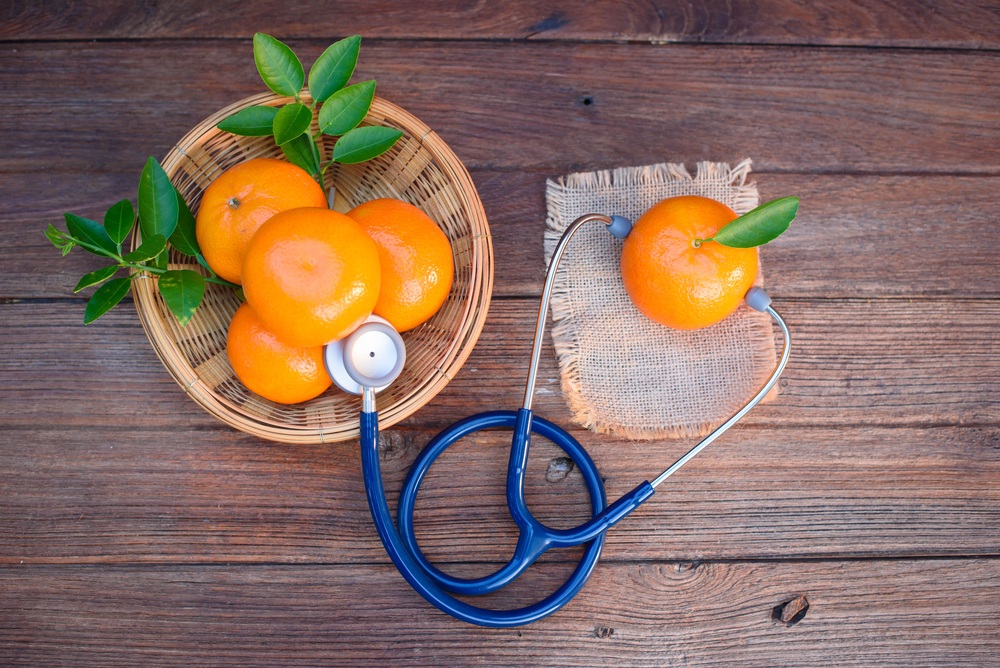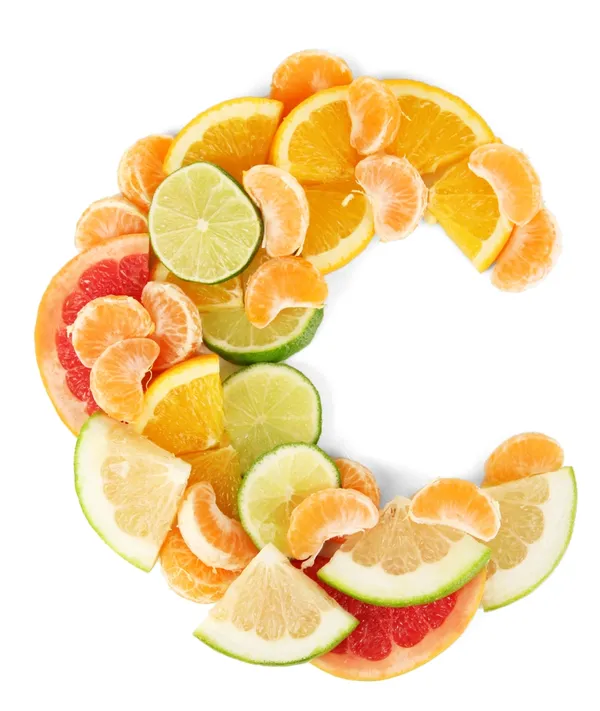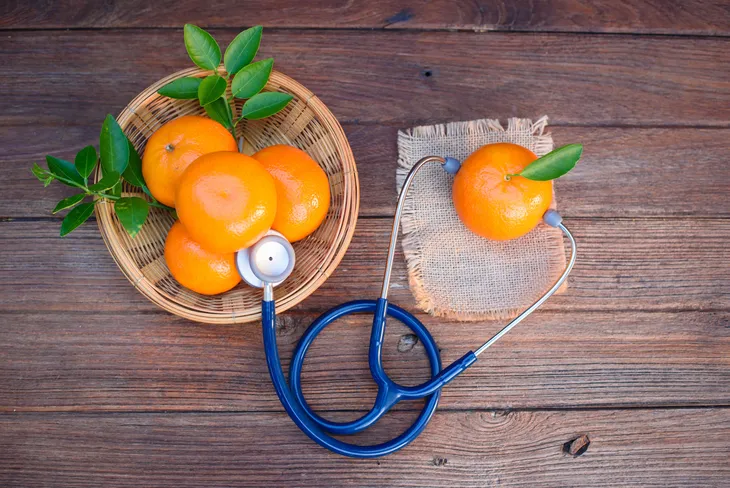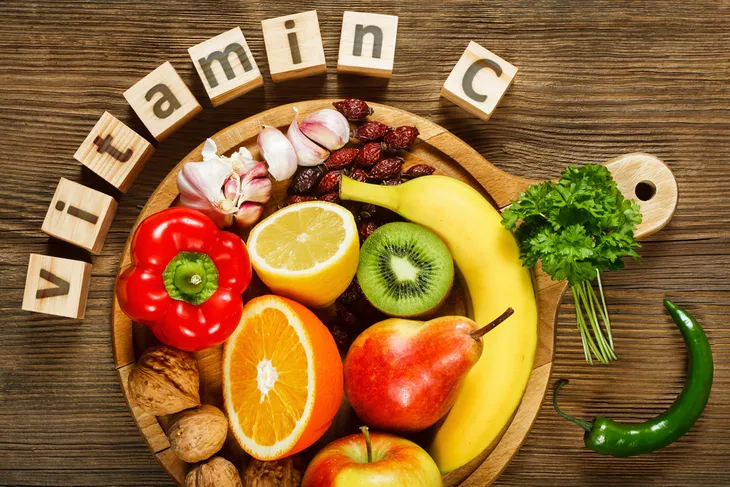You’ve been told many times by parents and doctors to get your vitamin C… but why, exactly? Turns out it’s for more than fighting off colds, although that is reportedly one of the benefits.
When you consume vitamin C from natural sources such as oranges, or take it with meals as a supplement, you’re giving your body a boost in many other ways. Let’s take a look at 14 health reasons to get your C…
An Iron-Clad Benefit
AuthorityDiet.com explains that taking vitamin C can actually help you absorb iron better, which “plays a key role in forming hemoglobin, and also supports muscle and brain function.” It also helps you avoid anemia and feeling fatigued, it adds.
It cites a study that shows 280-mg of vitamin C taken at breakfast will nearby double the amount of iron that your body absorbs on a daily basis.
A Solid Choice for Bones
When you think of bone health, you probably think about calcium first – and while it’s true that calcium is beneficial for bones and teeth, it’s not the only thing. WebMD published an article that says vitamin C is good for the bone, in older men in particular.
The source cites a study that shows “a high intake of vitamin C” may help reduce bone loss – the research uncovered higher bone density in the hips of men, but not the same benefit for women. This effect for men was most prominent at around 314-mg of vitamin C from food or supplements (high above the recommended daily levels of 90-mg a day for men), it adds.
A Friend to Calcium
Speaking of calcium, apparently vitamin C can also help your body absorb this essential element as well. LiveStrong notes that consuming certain vitamins and minerals can have an adverse effect on the absorption of others, the opposite may be true when it comes to calcium and C.
The source says for that reason, you should blend your calcium supplements with a source of vitamin C. “By drinking calcium-fortified orange juice, for example, you may be able to maximize your intake of both of these important compounds,” it notes.
You Can ‘C’ The Skin Benefits
Many people spend top dollar on skin creams and lotions to keep their skin looking young, and others go the extra mile for laser treatments to erase wrinkles. However, it turns out that just adding more C to your diet can help keep your skin looking supple.
The Telegraph explains vitamin C was the “most searched” beauty product of 2017 – “widely known for its antioxidant benefits for your body but also your skin, brilliantly boosting collagen while helping to treat UV exposure photo-damage.” However, keep in mind the source touts vitamin C enriched skin products, so you still might have to shell out some dollars.
Easier to Pee with C
We apologize for that headline (not really), but the point is that vitamin C can help prevent urinary tract infections (UTIs), which can lead to painful urination. “If you have ever suffered from a urinary tract infection, you know it is an experience you never want to repeat,” notes AuthorityDiet.
It notes that doctors may tell patients to drink citrus fruit juices high in C to help acidify urine, which in turn will help limit unfriendly bacteria that causes a UTI in the first place. It may also be useful if you already have a UTI and want to limit the symptoms, it adds.
C is For Circulation
DiabetesHealth.com says taking a daily supplement of vitamin C can be beneficial for healthy blood circulation – especially in patients that have type 2 diabetes, adds the source. “As a result, vitamin C may prove to be a potent combatant against diabetes-induced vascular disease,” it notes.
These diabetes-related vascular diseases can lead to complications such as retinopathy (which can lead to vision impairment and blindness), nephropathy (kidney problems), and atherosclerosis (causing excessive plaque build-up in the arteries).
Take the Vitamin to Heart
Many sources link vitamin C intake with lowered risk of heart disease, but NaturalHealth365.com has some solid numbers to back up the claim – it cites a study published in Journal of the American College of Nutrition that says men who are in “the highest third of vitamin C intake” have a whopping 66-percent less chance of developing coronary heart disease.
The exact reason for this heart benefit is unknown, but the source says scientists believe it may be linked to C’s ability to prevent endothelial dysfunction, which is the stiffening of arterial walls that can reduce blood flow – especially in patients that smoke, it adds.
Warding Off Alzheimer’s?
The Alzheimer’s Drug Discovery Foundation points out that vitamin C may be good for more than fighting colds and helping your heart – it may help lower the risk of dementia, which is deadly in the case of Alzheimer’s disease.
The source says “meta-analyses of observational research” shows diets rich in vitamins C and E are linked to up to a 25-percent lower risk of Alzheimer’s. However, the age and health status of subjects in each study varied, so the jury might still be out on just how much these two vitamins protect against dementia, if at all, it explains.
Dodging Scurvy
You might only think of scurvy as a disease that affected pirates travelling at sea during the age of discovery, but if not for vitamin C, you could just as easily fall victim to this condition that causes fatigue, skin lesions, and bleeding gums. As AuthorityDiet notes, it can be lethal if untreated.
“Scurvy is the direct result of a lack of vitamin C, a relationship which is well-documented throughout history,” explains the source. Luckily, it takes about a month or so of little to no C for symptom to manifest, and that’s pretty unlikely to occur in a modern diet – unless you happen to be traveling around on a pirate ship. Those who have scurvy can essentially cure it by eating an orange.
‘C’ The Benefits With Your Own Eyes
The American Optometric Association points out the benefits of vitamin C relating to eye health, and says that “scientific evidence suggests vitamin C lowers the risk of developing cataracts.” Cataracts cause the clouding of the eye’s lens, which requires surgery to correct.
The source explains that smoking, diabetes and steroid use can all lower levels of vitamin C in the eye’s lens, which can increase the risk of cataracts. It notes that “taken with other essential nutrients,” C can also help slow down progression of age-related macular degeneration (AMD) and visual acuity loss.
Improves Drive in the Bedroom?
If you’re looking to get a little boost in the bedroom, you could try some known aphrodisiacs such as oysters – but it turns out you don’t have to get that fancy, because vitamin C is “a proven trick” to increase sex drive, according to the Huffington Post.
The source says that Biological Psychiatry found that “high doses” of time-released vitamin C resulted in more “activity” (ahem), up from four to 14-times a month for most participants. Maybe there’s a reason those chocolate strawberries work so well – they are quite high in C (the chocolate is optional).
Muscling in On Aches
Here’s a pretty good reason to consume more vitamin C, especially if you’re advancing in age and getting a lot more muscle pains than you used to, or you’ve been training for a marathon. LiveStrong explains the vitamin “may contribute to reducing and relieving sore muscles.”
In particular, it talks about the benefits related to delayed onset muscle soreness from intense exercise that shows up eight hours or more after activity. The pain is from damaged muscle tissue, and the duration of the pain is from healing of torn muscle fibers, it adds. However, the source says it’s most beneficial to take C supplements a short time before and after exercise, as regular supplements may not have any effect – and may even “prevent your body from adapting to exercise.”















